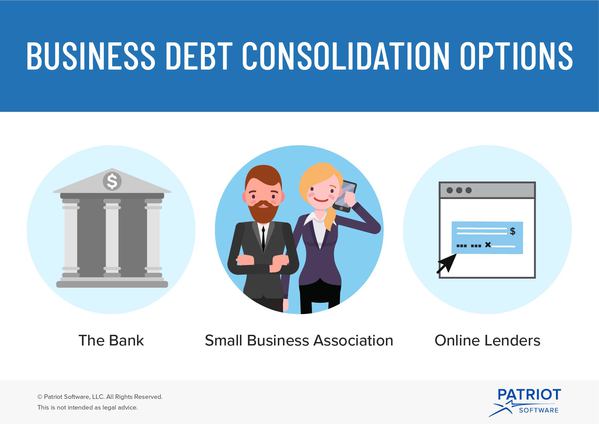The words “business debt” hold enough weight on their own. Throw in “consolidation” and just what exactly does that mean?
Simply put, business debt consolidation is the merging of several forms of debt (these can include various outstanding small business loans, such as lines of credit and term loans) into one new loan, and a single, streamlined monthly repayment. Consolidating business debt can make repaying business debt more manageable, and ideally, more affordable.
How does consolidating business debt work?
Oftentimes when people talk about consolidation, it is mistakenly lumped in with refinancing. And while those two may be similar, they are not quite the same.
With refinancing, you take out a whole new loan for the purpose of getting a lower interest rate. And while refinancing can sometimes involve multiple loans, that isn’t necessarily always the case.
For example, let’s say you have a business credit card with a balance of $20,000 at a rate of 19%. You qualify for a $20,000 term loan, with an interest rate of 12%. After factoring in additional fees, your annual percentage rate (APR) works out to be 14%. You’d use the $20,000 from your term loan to pay off your business credit card, so you could save money on interest — and while a few percentage points may not seem worth the effort, it could save you a sizeable amount of money in the long run.
Business debt consolidation works by, as mentioned, taking out one new, larger loan to pay off two or more smaller loans. The main purpose of consolidating business debt is to make your debt repayments more manageable. Getting a reduced rate is a bonus, but not a given.
To consolidate business debt, you’ll first want to check to make sure none of your current outstanding loans have a prepayment penalty. If there are prepayment penalties, you’ll want to factor in these fees when determining how much you should borrow.
From there, you should add up the total amount of those existing loans, so you know exactly how much you need to pay off as a whole. Here, it is helpful to determine the average APR of your existing loans, too, so you can make sure that your consolidation loan’s APR is not higher, and ultimately, costing you more money.
Should I consolidate my business debt?
There are a number of reasons you might want to consider starting the business debt consolidation process. If you are carrying multiple loans, it can be a good way to streamline your payments and get your head above water. The repayment process becomes more manageable and, with a possibly lower APR, potentially more affordable.
Let’s start with some of the pros:
- Your credit score could improve. Because payment history is a big factor in credit scores, building up a track record of on-time payments, thanks to the decrease in the chance of missing one or multiple loan payments, goes up.
- Your stress levels could go down. Instead of having to keep track of many individual monthly payments, having one all-inclusive loan means only remembering one due date and one interest rate. If possible, setup autopay so that the payment is taken care of automatically from your business checking account.
- You could see a lower interest rate, which means more cash flow on hand.
Then there are some cons:
- The threat of compound interest. Since you are paying what you owe on your original loans (that is, principal plus interest), that could mean that, even with a lower interest rate, you could end up paying more because of compound interest.
- It’s risky to see this band-aid as a more permanent solution. If there are deeper cash flow issues, a debt consolidation loan won’t fix them, but it may give the temporary illusion that business is on the up. This could set you up for a difficult financial situation in the future.
Business debt consolidation: What are my options?
When it comes time to apply for a business consolidation loan, there are a few routes you can take.
The bank
A bank is often the first place that springs to mind when it comes time to talk loan applications. They can offer consolidation loans at relatively lower rates and, if you’ve kept up a good financial relationship with an institution, a bank is likely an excellent place to apply. These loans, though, can often be difficult to qualify for, especially if you do not have years of operating experience, strong revenues, and a top-notch credit score.
Small Business Association
The Small Business Association (SBA) offers various loan options, including 7(a) loans, commonly used for debt consolidation. With a 7(a) loan, you can borrow up to $5 million for your small business. The rates are competitive, too, and they tend to be more accepting of newer businesses. That being said, applying for 7(a) loan tends to be time-intensive and laborious. Between heaps of paperwork and the underwriting process, it’s not uncommon for it to take as long as 60 to 90 days for you to get a decision — and you might not even be approved.
Online lenders
In this day and age, of course, there are countless online lenders you can turn to. They can offer the same competitive interest rates as SBA loans, but with a much faster turnaround time — we’re talking a few days instead of a few months. Online lenders have their own particular borrowing limits and repayment terms, but most offer term loans between $25,000 to $500,000, with terms extending from six months to five years.

How to get a small business debt consolidation loan
When it comes time to get your consolidation loan, it is recommended to do your research into multiple business funding options so you can be sure that you are getting the terms that work for your business. Also, you should research into your own debt: how much do you have total and what are the varying terms?
Once you have a good overview of your debt, you will want to compare it to the terms of your potential consolidation. If, at the end of it all, you will be paying more overall or you will have a higher APR, you may decide that it is not worth it.
If it is in your best interest to consolidate, though, the next step is to make sure you qualify (so you don’t waste your time applying for something you’re ineligible for in the first place).
From there, you should gather all your existing loan documentation and apply at either a bank, an SBA, or with an online lender.
Debt consolidation may not be for everyone, but it can be an excellent tool to streamline what a business owes, and help get you back on track and breathing easier.
These views are made solely by the author.
